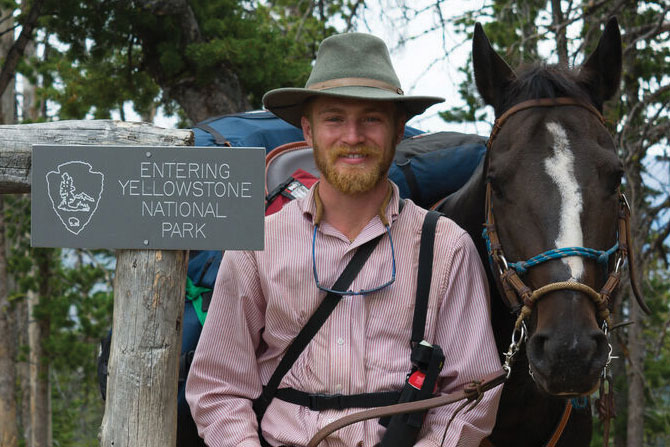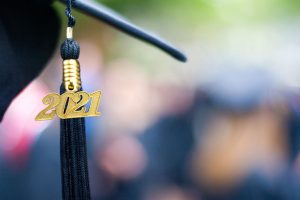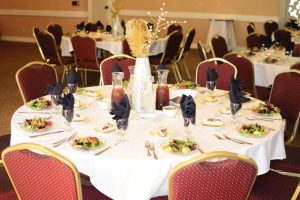First, a bit about Nick …
I grew up in Holladay, Utah, with my parents, Wendy and Jamie, and my younger brother, Alex. Even before we could walk, my parents worked hard to instill a love of the outdoors in us. We went camping every weekend, backpacking, skiing, or biking. It was a running joke among my parents’ friends that no matter where they camped on Friday night, they would wake up to Wendy and Jamie there in the morning. It was a ton of work on their part, whether it was packing up after a long day at work or four-year-old me giggling in the bike trailer as I shrieked at dad, “faster, faster!” as he peddled up a steep hill. My parents’ hard work paid off, though, and I developed a deep love of the wild places around us. After undergrad, I even took off on a backpacking trip across the country, where I covered 1,200 miles of trail in 26 different parks over six months. There were so many memorable trips — solo horse packing through Yellowstone, picking wine barrels in Napa, deciding I could travel faster cross country, and being terribly wrong — it’s hard to pick a favorite, but that’s part of the fun.
Besides being outside, I love picking up new hobbies and absolutely diving down a rabbit hole. One of my favorites that’s been put on a bit of a hiatus with school is woodworking. I love building furniture and use mostly hand tools — some of them even belonged to my great grandfather — because of how meditative the process is. When school started, I was in the middle of building a bed, and though I haven’t managed to get much further, I’m looking forward to completing it and starting another project.
My other recent hobby is dog training. I have a two-year-old wirehaired pointing griffon named Sevro, who is my adventure buddy. He loves biking, backcountry skiing, hiking, frisbee and is absolutely obsessed with birds. It has been so much fun to dive more into training, learning about the different approaches, and working through the many challenges of having a dog. Sometimes the progress is slow, but Sevro loves to work, and it is so rewarding to see the progress he’s made. The only problem is now my entire camera roll is pictures of my dog.
The journey to medical school
My interest in medicine first stemmed from my parents. My mom is a physical therapist, and my dad is a family medicine doctor, so in the eyes of tiny Nick, they could solve anything, and who didn’t want to be like that. Through school, I began focusing more on the academic challenges of medicine, and found a way to turn almost every school project in my K-12 education toward medicine. Why I thought it was warranted for a fifth grader to have Netter and the Merck Manual on my desk for a school project, I’ll never know. College took me to the East Coast, where I was ecstatic to attend Johns Hopkins University and receive my BS in Chemical and Biomolecular Engineering. I loved both the breadth and depth of the subjects we covered and the problem-solving skills they taught us. While I probably won’t ever need to tune a controls system for a chemical reactor, it was an invaluable experience that helped shape the way I approach problems. While at school, I began working in a lab exploring the effect of cellular senescence on cancer development. It was a fantastic experience, and I learned a ton about the academic process, different lab procedures, and the fact that I did not want to do benchwork in a lab for the rest of my life.
After school, I took some time off and waited tables, volunteered, and applied to medical school. It was volunteering at the Maliheh Clinic during this time that showed me why I really wanted to go into medicine; the people. After volunteering there for three years, I knew many of the patients and was able to celebrate their accomplishments and see just how much it meant to them to have support and help in the medical challenges they were facing. I loved that interaction, and it really focused my drive to become a physician.
Why Family Medicine?
My decision to pursue family medicine is again because of the people. I love getting to know patients over time, understanding many of the challenges they are facing in their lives, and working on aspects of health that may not be strictly medical. That close relationship family medicine physicians build with their patients over time is something I want to embody in my practice and hopefully develop enough trust that people recommend me to their friends and family. The medicine itself is also highly appealing because of the wide diversity of patients and problems present in a family medicine clinic. I love the idea of being well versed in my knowledge and being able to help patients with a broad spectrum of problems. To this point, I am also very passionate about the manipulative component of my education, and being a family physician will give me ample opportunity to use that to benefit my patient population.
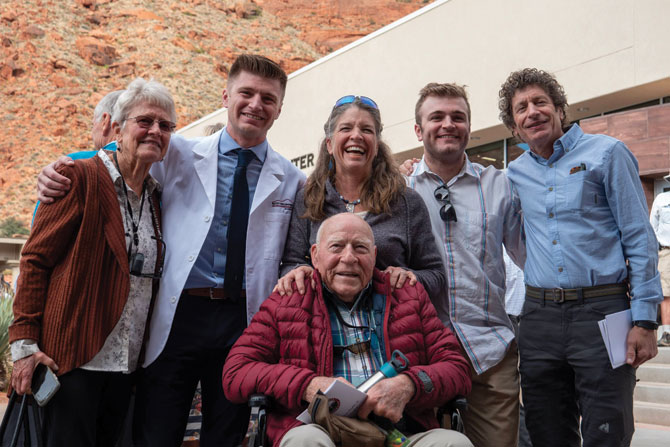
My decision to pursue family medicine is again because of the people. I love getting to know patients over time, understanding many of the challenges they are facing in their lives, and working on aspects of health that may not be strictly medical.
What was it that drew you to apply at Rocky Vista University Southern Utah?
The main aspects that drew me to Rocky Vista University- SU are that I wanted to attend a DO school, their emphasis on manipulative medicine, the proximity to my family in Salt Lake City, and the sense of community I got from the students. In talking to my parents and providers I shadowed, I found that much of the advice I was given was echoed in the philosophies taught and emphasized in DO programs. Through my mom’s work as a PT, I also saw how helpful manipulation could be to patients. Through visiting schools during interview season, I was impressed by how many of these tenets were heavily emphasized at RVU and the scope and depth of the manipulative training compared to other programs. Also, when visiting the school, students went out of their way to talk to all the interviewees. They weren’t officially part of the interview day, but throughout my visit, the fact that people took time out of their busy study schedule to talk to us, heckle each other in a good-natured manner, and overall seemed to actually be a community thoroughly impressed me. These reasons, combined with a competitive match rate and being close to my support network in Salt Lake, made it an easy decision for me that I am exceedingly happy with.
Looking back on the past year of medical school during COVID-19, how has the pandemic affected your learning experience? Are you optimistic that the upcoming school year will look a bit more traditional?
The most significant detriment to my learning experience from the pandemic has been the severely decreased hands-on skills and patient interaction. We still had all our regular classwork but could not see patients at the veterans’ home like usual or have the same number of practice patient encounters. With conditions improving, I’m very optimistic that this will change for the upcoming year, especially with vaccinations being widely available. It is essential to have these experiences to become more comfortable with patients because it’s one of the main things they will judge us on. This is one reason I’m very excited I was selected for a manipulative medicine teaching fellowship. I will get additional time working with patients and be more confident with my exam skills and patient interaction.
2021 was another record year for the number of students matching into family medicine residencies. What do you think the general public needs to understand about the importance of more doctors going into family medicine? What is it that makes you most proud of going into this specialty?
I think the most crucial aspect of increasing the number of physicians going into family medicine and the public awareness of it is simply lowering the perceived barriers of going to the doctor. Many of the long-term health conditions plaguing our population would benefit significantly from preventative medicine and early diagnosis. On top of this, many of the things people are going to specialists for could be done by a family physician at a regular visit while also addressing other health concerns. By creating a system with more high-quality family physicians that the populace actively sees regularly, we can decrease the strain of morbidities on our health care system, decrease the overall cost of health care, and ensure that patients are seeing the right specialist when they need to. Overall it is a massive benefit to the community around us to have these increased numbers of primary care providers participating in the community. Unfortunately, we are still far from where we need to be to adequately address peoples’ needs, but I’m optimistic that this is being addressed and more people are seeing the added value of primary care.
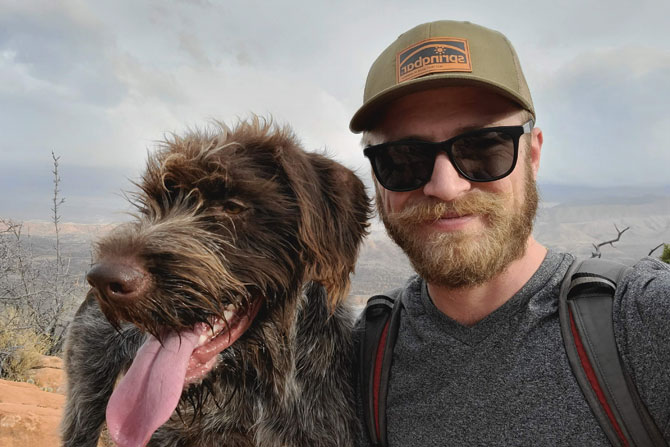
What accomplishment are you most proud of in medical school?
I’ve been very involved in my school community as the president of both the family medicine interest group (ACOFP) and the manipulative medicine interest group (SAAO). During my time, we have won national awards and recognition for both clubs. I’ve been really proud of how much we’ve educated the student body about hands-on skills and the breadth of opportunities in primary care. The thing I’m most proud of, however, is my teaching fellowship. I was selected for a manipulative medicine teaching fellowship where I will spend an extra year helping teach first and second years and receive additional training, education, and hands-on time with patients. I’m proud that my hard work and effort to educate my classmates about this subject were recognized, and I was selected to further pursue a topic I am so passionate about.



